-
 Whether you're looking for how to engage the resistant child, turn Adverse Childhood Experiences (ACEs) into opportunities for growth and resilience, use yoga to increase your ability to connect to yourself and your clients, or create a neuroception of safety in the playroom, we have you covered. Explore these topics and so many others in our one-hour courses below. Then choose 4 courses to create a bundle for only $119 and save (valued at $140 USD!) You can buy as many bundles as you would like (each as a new order)! See below for course descriptions. To view course details and objectives, click to the right of the title.
Whether you're looking for how to engage the resistant child, turn Adverse Childhood Experiences (ACEs) into opportunities for growth and resilience, use yoga to increase your ability to connect to yourself and your clients, or create a neuroception of safety in the playroom, we have you covered. Explore these topics and so many others in our one-hour courses below. Then choose 4 courses to create a bundle for only $119 and save (valued at $140 USD!) You can buy as many bundles as you would like (each as a new order)! See below for course descriptions. To view course details and objectives, click to the right of the title. -
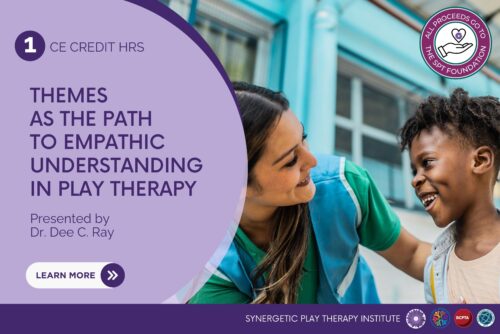 Play therapists often believe that they are lost in understanding the play and perspective of children in the play therapy process. This limitation leads to doubts about how to respond to children and how to conceptualize what is happening in play therapy. Through discovering themes of children and their play, a play therapist can empathically respond to the individual nature of each child client, leading to greater understanding in the therapeutic relationship. This webinar will offer the process for identification of themes, understanding the progression of theme resolution, and ways in which the play therapist can respond more accurately within session. Therapists will walk away knowing the typical themes that emerge in play therapy and a process by which they can learn to be more empathically attuned to their clients.
Play therapists often believe that they are lost in understanding the play and perspective of children in the play therapy process. This limitation leads to doubts about how to respond to children and how to conceptualize what is happening in play therapy. Through discovering themes of children and their play, a play therapist can empathically respond to the individual nature of each child client, leading to greater understanding in the therapeutic relationship. This webinar will offer the process for identification of themes, understanding the progression of theme resolution, and ways in which the play therapist can respond more accurately within session. Therapists will walk away knowing the typical themes that emerge in play therapy and a process by which they can learn to be more empathically attuned to their clients. -
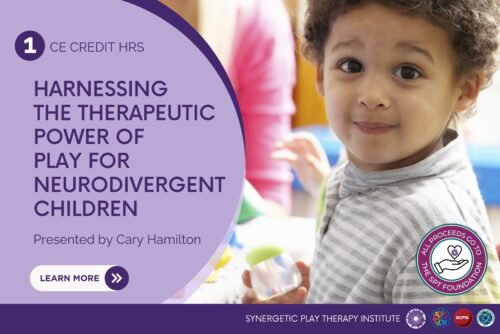 This inspiring one-hour course dives into the transformative role of play therapy in supporting neurodivergent children. Gain insights into how play can help address processing differences, executive functioning challenges, and sensory sensitivities equipping you to meet these unique profiles with confidence and compassion. Guided by over 20 years of professional and personal experience, Cary Hamilton will reveal practical, neurodiversity-affirming, play-based interventions designed to foster connection, emotional regulation, and resilience. You’ll walk away with actionable strategies to enhance your clinical practice, deepening your ability to create meaningful and effective therapeutic relationships with neurodivergent children. Don’t miss this opportunity to expand your skills, enrich your practice, and make a lasting impact on the lives of neurodivergent children and their families!
This inspiring one-hour course dives into the transformative role of play therapy in supporting neurodivergent children. Gain insights into how play can help address processing differences, executive functioning challenges, and sensory sensitivities equipping you to meet these unique profiles with confidence and compassion. Guided by over 20 years of professional and personal experience, Cary Hamilton will reveal practical, neurodiversity-affirming, play-based interventions designed to foster connection, emotional regulation, and resilience. You’ll walk away with actionable strategies to enhance your clinical practice, deepening your ability to create meaningful and effective therapeutic relationships with neurodivergent children. Don’t miss this opportunity to expand your skills, enrich your practice, and make a lasting impact on the lives of neurodivergent children and their families! -
 With their changing brains and hormones, finding ways to integrate play with pre-teens and teens can at times just feel “Awkward”. Learn how to navigate therapy with our clients who are no longer children, but also not quite yet adults. From twelve-year-olds to seniors in high school, adolescence is a time filled with change. This can make the notion of bringing play therapy to this population a challenge. Do we play? Do we talk? Do I ask questions? What do I do?" As such, many therapists find themselves at a loss with this age group, feeling just as confused as they do! In this workshop, play therapists will delve into the mysteries of the teenage mind as we bust myths and glean insight into how to best offer therapeutic support. Using neuroscience, Developmental, Synergetic, and Systemic theories, participants will explore how to navigate this "awkward" and sometimes "overwhelming" developmental stage using an eclectic framework of non-directive and directive play therapy approaches. Understanding how to assess the teen's emotional age, an area often missed when working with this population, will also be covered as a way to understand how to incorporate play into the therapy process. The information presented is designed to open minds and hearts as participants uncover the wisdom of the changing brain and the wisdom of the teenage years. Through lecture, demonstration, and discussion, this workshop will deconstruct this mysterious stage and support play therapists in discovering how they can help mature and remodel the teenage brain, while supporting movement towards the discovery of the authentic self- the cornerstone of the development of a teenager's identity. To get a sense for the course, check out this short video below:See course details below.
With their changing brains and hormones, finding ways to integrate play with pre-teens and teens can at times just feel “Awkward”. Learn how to navigate therapy with our clients who are no longer children, but also not quite yet adults. From twelve-year-olds to seniors in high school, adolescence is a time filled with change. This can make the notion of bringing play therapy to this population a challenge. Do we play? Do we talk? Do I ask questions? What do I do?" As such, many therapists find themselves at a loss with this age group, feeling just as confused as they do! In this workshop, play therapists will delve into the mysteries of the teenage mind as we bust myths and glean insight into how to best offer therapeutic support. Using neuroscience, Developmental, Synergetic, and Systemic theories, participants will explore how to navigate this "awkward" and sometimes "overwhelming" developmental stage using an eclectic framework of non-directive and directive play therapy approaches. Understanding how to assess the teen's emotional age, an area often missed when working with this population, will also be covered as a way to understand how to incorporate play into the therapy process. The information presented is designed to open minds and hearts as participants uncover the wisdom of the changing brain and the wisdom of the teenage years. Through lecture, demonstration, and discussion, this workshop will deconstruct this mysterious stage and support play therapists in discovering how they can help mature and remodel the teenage brain, while supporting movement towards the discovery of the authentic self- the cornerstone of the development of a teenager's identity. To get a sense for the course, check out this short video below:See course details below. -
 This webinar will explore the myriad ways in which children show us the hard things that have happened to them. There are as many ways for children to share their pain with us as there are stories to be told. After three decades of Storykeeping, TraumaPlay has identified three primary posttraumatic play pathways that children use to create coherence in their internal narratives. These three pathways allow for play-based gradual exposure to occur while integrating thoughts, feelings, and sensory impressions connected to the trauma. TraumaPlay gives permission for a “yes, and” approach to the sometimes overwhelming question of whether to use directive or non-directive play therapy approaches with traumatized children and expands our conceptual framework for following the child’s need in trauma processing.
This webinar will explore the myriad ways in which children show us the hard things that have happened to them. There are as many ways for children to share their pain with us as there are stories to be told. After three decades of Storykeeping, TraumaPlay has identified three primary posttraumatic play pathways that children use to create coherence in their internal narratives. These three pathways allow for play-based gradual exposure to occur while integrating thoughts, feelings, and sensory impressions connected to the trauma. TraumaPlay gives permission for a “yes, and” approach to the sometimes overwhelming question of whether to use directive or non-directive play therapy approaches with traumatized children and expands our conceptual framework for following the child’s need in trauma processing. -
 Parents are a powerful force in a child’s life. Inviting them into the play therapy process is essential for creating lasting change. But let’s face it—this isn’t always easy! Many clinicians, both new and seasoned, struggle with how to effectively involve parents in therapy sessions. This dynamic course with Clair Mellenthin, LCSW, RPT-S, will equip you with the skills and confidence to build strong alliances with parents while integrating them into play therapy. Using the Attachment-Centered Play Therapy model, you’ll explore the hows, whys, whens, and what-to-dos of parent-child play therapy. You’ll also uncover practical interventions to foster attachment and connection while reflecting on the roadblocks that might arise in your own practice. It’s all designed to help you deepen your understanding of parent-child dynamics, empowering you to create meaningful change for families. Get ready to play, reflect, and transform your approach to parent involvement in therapy!
Parents are a powerful force in a child’s life. Inviting them into the play therapy process is essential for creating lasting change. But let’s face it—this isn’t always easy! Many clinicians, both new and seasoned, struggle with how to effectively involve parents in therapy sessions. This dynamic course with Clair Mellenthin, LCSW, RPT-S, will equip you with the skills and confidence to build strong alliances with parents while integrating them into play therapy. Using the Attachment-Centered Play Therapy model, you’ll explore the hows, whys, whens, and what-to-dos of parent-child play therapy. You’ll also uncover practical interventions to foster attachment and connection while reflecting on the roadblocks that might arise in your own practice. It’s all designed to help you deepen your understanding of parent-child dynamics, empowering you to create meaningful change for families. Get ready to play, reflect, and transform your approach to parent involvement in therapy! -
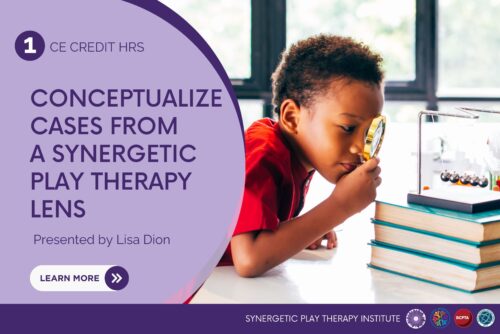 The Synergetic Play Therapy Institute in collaboration with PIP Solutions presents “Conceptualizing Cases from a Synergetic Play Therapy Lens”. Translating a right brain play experience into a left brain conceptualization is not an easy task. Play therapists often grapple with a sense of uncertainty when trying to comprehend a child’s unique therapeutic progression and assessing whether goals are being achieved. This course, led by Lisa Dion, aims to address this issue by introducing a structured framework derived from Synergetic Play Therapy. Students will gain insights into how to conceptualize cases effectively and apply this framework to enhance the efficacy of their therapeutic interventions.
The Synergetic Play Therapy Institute in collaboration with PIP Solutions presents “Conceptualizing Cases from a Synergetic Play Therapy Lens”. Translating a right brain play experience into a left brain conceptualization is not an easy task. Play therapists often grapple with a sense of uncertainty when trying to comprehend a child’s unique therapeutic progression and assessing whether goals are being achieved. This course, led by Lisa Dion, aims to address this issue by introducing a structured framework derived from Synergetic Play Therapy. Students will gain insights into how to conceptualize cases effectively and apply this framework to enhance the efficacy of their therapeutic interventions. -
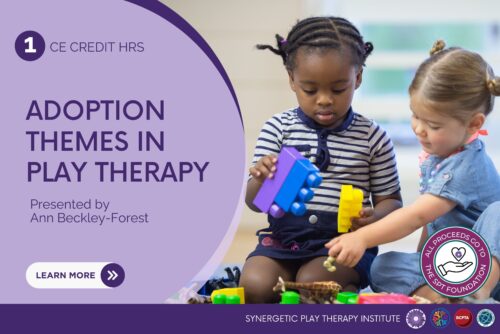 While adoption is often seen as the solution to the problem of child maltreatment, the disruption of primary attachments is also a risk factor for children after placement. Play therapists can play an important role in recognizing the impact of these attachment wounds as well as themes of belonging and identity formation that become increasingly pressing for children as they grow up in adoptive families, foster families, and kinship adoption. In this session we will look at a prescriptive play therapy approach to this work including the themes that can emerge in the child’s play, approaching the traumatic history of disruption and placement through the attachment narratives, and how to support the adoptive parents in adjusting their expectations and strategies. Of special note will be the important considerations related to race, ethnicity, and culture that often impact the adoption kinship network and ways to invite those themes in the play therapy process.
While adoption is often seen as the solution to the problem of child maltreatment, the disruption of primary attachments is also a risk factor for children after placement. Play therapists can play an important role in recognizing the impact of these attachment wounds as well as themes of belonging and identity formation that become increasingly pressing for children as they grow up in adoptive families, foster families, and kinship adoption. In this session we will look at a prescriptive play therapy approach to this work including the themes that can emerge in the child’s play, approaching the traumatic history of disruption and placement through the attachment narratives, and how to support the adoptive parents in adjusting their expectations and strategies. Of special note will be the important considerations related to race, ethnicity, and culture that often impact the adoption kinship network and ways to invite those themes in the play therapy process. -
 Embark on an enlightening journey with Lisa Dion as she delves into strategies for optimizing the intake process! In this course, you will gain insights into how the foundation of a therapeutic relationship is laid during the intake session and how this extends throughout the entire intake and into the clinical engagement. Lisa will impart valuable lessons on structuring the intake, commencing from the initial point of contact all the way to the conclusion of the session. Witness how Lisa skillfully incorporates key themes from Synergetic Play Therapy®, such as the regulation of the nervous system and a nuanced understanding of how the brain functions, into the intake process. We will also explore the pivotal and validating role of the therapist in the playroom, emphasizing how their presence can significantly influence the dynamics of the therapeutic relationship with the client, family, and beyond.
Embark on an enlightening journey with Lisa Dion as she delves into strategies for optimizing the intake process! In this course, you will gain insights into how the foundation of a therapeutic relationship is laid during the intake session and how this extends throughout the entire intake and into the clinical engagement. Lisa will impart valuable lessons on structuring the intake, commencing from the initial point of contact all the way to the conclusion of the session. Witness how Lisa skillfully incorporates key themes from Synergetic Play Therapy®, such as the regulation of the nervous system and a nuanced understanding of how the brain functions, into the intake process. We will also explore the pivotal and validating role of the therapist in the playroom, emphasizing how their presence can significantly influence the dynamics of the therapeutic relationship with the client, family, and beyond. -
 Helping children learn how to regulate is essential, but without first strengthening the child's interoceptive sense, regulation may not be successful. This experiential workshop offers various opportunities to explore how play can develop this fundamental part of the sensory system. As play therapists, there is an understanding that regulation and co-regulation are essential skills that must be developed in order to have successful relationships and manage emotions, and are essential for trauma integration; however, what many play therapists may not fully understand is that there is a prerequisite that needs to be in place for regulation skills to be effective. What has been understood for years in the world of Occupational Therapy is now becoming a primary focus of education for play therapists. This important understanding is that the child’s interoceptive sense, the 8th sensory system that is responsible for letting the brain know how the body is doing, must be developed first before a child can successfully regulate and co-regulate. Without the development and strengthening of the interoceptive sense, a child may have all kinds of regulation knowledge and tools but will not be able to read their own body cues to know when to use any of them. Examples such as knowing when to use the bathroom, when to take a deep breath, when to ask for help, the ability to read non-verbal cues, knowing when emotions are feeling overwhelming, etc. all rely on interoception. This playful workshop is designed to help play therapists learn what the interoceptive sense is and how to use play to develop interoception in their child clients setting the stage for successful regulation and co-regulation. Play therapists will have fun experientially exploring this fundamental part of the sensory system! (This course is a recording of a 2 hour live webinar held in November 2023) See course details below.
Helping children learn how to regulate is essential, but without first strengthening the child's interoceptive sense, regulation may not be successful. This experiential workshop offers various opportunities to explore how play can develop this fundamental part of the sensory system. As play therapists, there is an understanding that regulation and co-regulation are essential skills that must be developed in order to have successful relationships and manage emotions, and are essential for trauma integration; however, what many play therapists may not fully understand is that there is a prerequisite that needs to be in place for regulation skills to be effective. What has been understood for years in the world of Occupational Therapy is now becoming a primary focus of education for play therapists. This important understanding is that the child’s interoceptive sense, the 8th sensory system that is responsible for letting the brain know how the body is doing, must be developed first before a child can successfully regulate and co-regulate. Without the development and strengthening of the interoceptive sense, a child may have all kinds of regulation knowledge and tools but will not be able to read their own body cues to know when to use any of them. Examples such as knowing when to use the bathroom, when to take a deep breath, when to ask for help, the ability to read non-verbal cues, knowing when emotions are feeling overwhelming, etc. all rely on interoception. This playful workshop is designed to help play therapists learn what the interoceptive sense is and how to use play to develop interoception in their child clients setting the stage for successful regulation and co-regulation. Play therapists will have fun experientially exploring this fundamental part of the sensory system! (This course is a recording of a 2 hour live webinar held in November 2023) See course details below. -
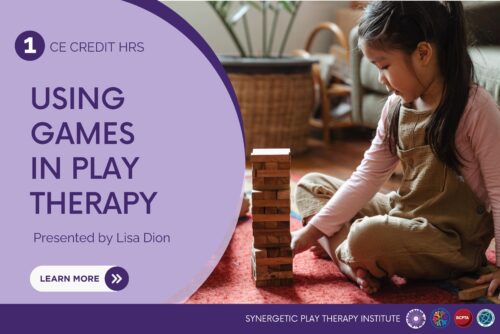 From a stroll through the Lollipop woods of Candyland to a fight over the Thimble in Monopoly, games are part of childhood. In the playroom, certain games are more commonly used than others. How do we use chess as a pawn in our therapeutic healing? How can we call on checkers to check on the child’s state of regulation? What does a game tell us about a child’s emotional world? This webinar explores these questions and more!
From a stroll through the Lollipop woods of Candyland to a fight over the Thimble in Monopoly, games are part of childhood. In the playroom, certain games are more commonly used than others. How do we use chess as a pawn in our therapeutic healing? How can we call on checkers to check on the child’s state of regulation? What does a game tell us about a child’s emotional world? This webinar explores these questions and more! -
 This workshop equips play therapists with practical, role-affirming strategies to strengthen collaboration with educators. You’ll discover how to support teachers in ways that honor their expertise and responsibilities—while still bringing your own clinical lens to the table. In compliance-heavy, high-stress environments, educators often feel unseen or overwhelmed. Together, we’ll examine how we may unintentionally be “shoulding” educators—adding to their stress—and explore how to instead foster empowerment, clarity, and authentic connection. Blending clinical insight with hands-on application, this session helps you partner with educators in ways that build trust, reduce overwhelm, and create space for growth.
This workshop equips play therapists with practical, role-affirming strategies to strengthen collaboration with educators. You’ll discover how to support teachers in ways that honor their expertise and responsibilities—while still bringing your own clinical lens to the table. In compliance-heavy, high-stress environments, educators often feel unseen or overwhelmed. Together, we’ll examine how we may unintentionally be “shoulding” educators—adding to their stress—and explore how to instead foster empowerment, clarity, and authentic connection. Blending clinical insight with hands-on application, this session helps you partner with educators in ways that build trust, reduce overwhelm, and create space for growth.

